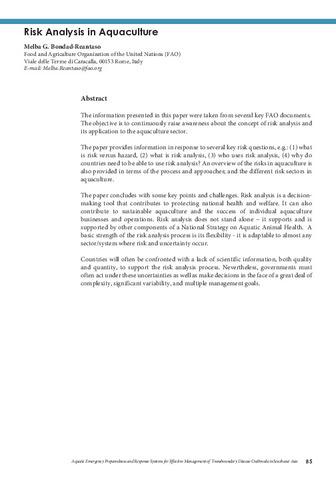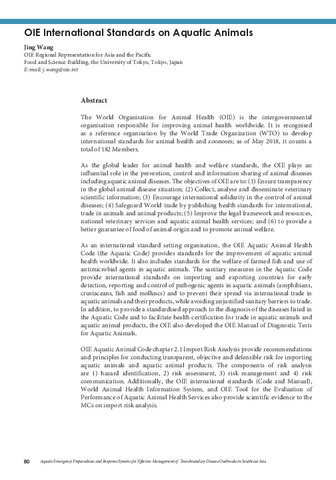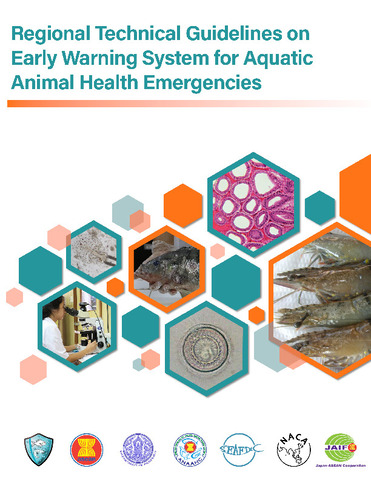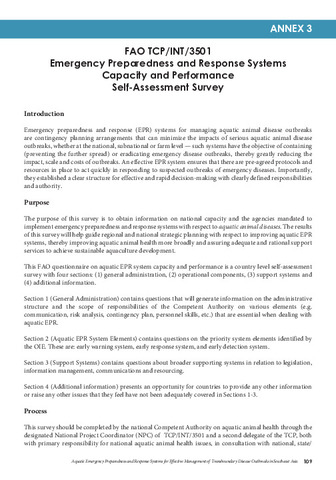Risk analysis in aquaculture
- Global styles
- MLA
- Vancouver
- Elsevier - Harvard
- APA
- Help
Share
Abstract
The information presented in this paper were taken from several key FAO documents. The objective is to continuously raise awareness about the concept of risk analysis and its application to the aquaculture sector.The paper provides information in response to several key risk questions, e.g.: (1) what is risk versus hazard, (2) what is risk analysis, (3) who uses risk analysis, (4) why do countries need to be able to use risk analysis? An overview of the risks in aquaculture is also provided in terms of the process and approaches; and the different risk sectors in aquaculture.The paper concludes with some key points and challenges. Risk analysis is a decisionmaking tool that contributes to protecting national health and welfare. It can also contribute to sustainable aquaculture and the success of individual aquaculture businesses and operations. Risk analysis does not stand alone - it supports and is supported by other components of a National Strategy on Aquatic Animal Health. A basic strength of the risk analysis process is its flexibility - it is adaptable to almost any sector/system where risk and uncertainty occur.Countries will often be confronted with a lack of scientific information, both quality and quantity, to support the risk analysis process. Nevertheless, governments must often act under these uncertainties as well as make decisions in the face of a great deal of complexity, significant variability, and multiple management goals.
Suggested Citation
Bondad-Reantaso, M. G. (2019). Risk analysis in aquaculture. In E. A. Tendencia, L. D. de la Peña, & J. M. V. de la Cruz (Eds.), Aquatic Emergency Preparedness and Response Systems for Effective Management of Transboundary Disease Outbreaks in Southeast Asia: Proceedings of Asean Regional Technical Consultation, 20-22 August 2018, Centara Grand Central Ladprao, Bangkok, Thailand (pp. 85-91). Tigbauan, Iloilo, Philippines: Aquaculture Department, Southeast Asian Fisheries Development Center.
Type
Conference paperISBN
9789719931089
Related items
Showing items related by title, author, creator and subject.
-
OIE international standards on aquatic animals
Wang, Jing (Aquaculture Department, Southeast Asian Fisheries Development Center, 2019)The World Organisation for Animal Health (OIE) is the intergovernmental organisation responsible for improving animal health worldwide. It is recognised as a reference organisation by the World Trade Organization (WTO) to ... -
Regional technical guidelines on early warning system for aquatic animal health emergencies
Southeast Asian Fisheries Development Center, Aquaculture Department; The Drafting Committee of the Regional Technical Guidelines for Early Warning System on Aquatic Animal Health Emergencies (Aquaculture Department, Southeast Asian Fisheries Development Center, 2020)This Regional Technical Guidelines for Early Warning System on Aquatic Animal Health Emergencies was developed to enumerate the actions to be undertaken by the AMS in case of the occurrence of known, unknown, existing, ... -
FAO TCP/INT/3501: Emergency preparedness and response systems capacity and performance self-assessment survey
Tendencia, Eleonor A.; de la Peña, Leobert D.; de la Cruz, Joesyl Marie V.; FAO (Aquaculture Department, Southeast Asian Fisheries Development Center, 2019)The purpose of this survey is to obtain information on national capacity and the agencies mandated to implement emergency preparedness and response systems with respect to aquatic animal diseases. The results of this survey ...






